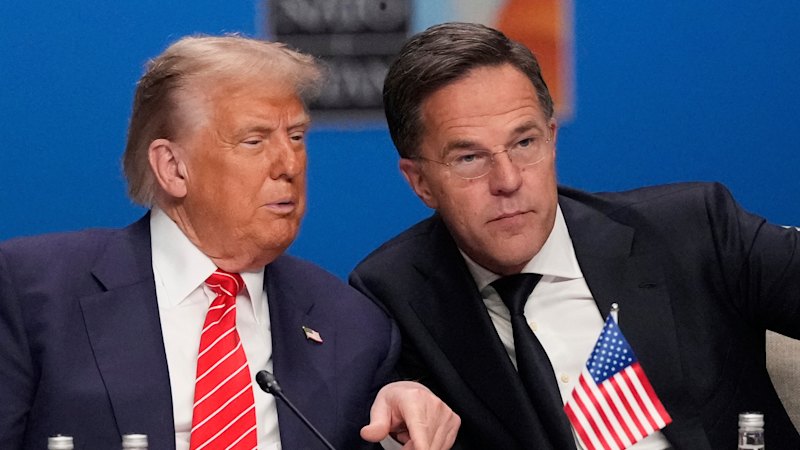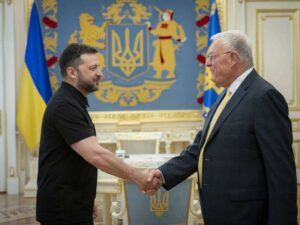
NATO Secretary-General Mark Rutte will meet with President Donald Trump this week as the United States plans to sell advanced weaponry to NATO allies, who can then supply it to Ukraine. Rutte’s visit to Washington is scheduled for Monday and Tuesday, where he will also engage with Secretary of State Marco Rubio, Defense Secretary Pete Hegseth, and members of Congress.
“I’m gonna have a meeting with the secretary-general who’s coming in tomorrow,” Trump stated to reporters upon his arrival in Washington on October 29, 2023. He emphasized that the U.S. would be sending “various pieces of very sophisticated weapons” to allies, who are expected to cover the full costs. This shift in U.S. policy marks a significant development in the ongoing conflict, as Trump has previously been critical of military assistance to Ukraine.
Republican Senator Lindsey Graham remarked that the situation in Ukraine is approaching a pivotal moment. He noted Trump’s increasing interest in aiding Ukraine’s resistance against Russia, a cause that the former president had initially deemed a misuse of U.S. taxpayer dollars. “In the coming days, you’ll see weapons flowing at a record level to help Ukraine defend themselves,” Graham said during an appearance on CBS’s Face the Nation.
The discussions between Trump and Rutte come shortly after Trump hinted at delivering a “major statement” regarding Russia. Ukraine has been grappling with intensified aerial assaults from Russian forces, further complicating its defense efforts. Trump declined to provide additional details ahead of his anticipated announcement, stating, “We’re going to see what we will see tomorrow.”
There is a growing consensus among lawmakers regarding the use of approximately $300 billion in Russian assets that were frozen by the Group of Seven (G7) nations earlier in the conflict. Senator Richard Blumenthal, a Democrat from Connecticut, expressed support for utilizing these funds to aid Ukraine, declaring, “It’s time to do it.”
Rubio noted that some of the weapons requested by Ukraine are currently deployed with NATO allies in Europe, allowing for quicker transfer options. European nations could subsequently procure replacements from the United States, streamlining support for Ukraine’s defense.
French Defense Minister Sébastien Lecornu highlighted that European officials have been advocating for enhanced air defense capabilities in upcoming military packages. He indicated that France currently lacks the capacity to send new ground-air missiles to Ukraine until next year.
In addition to arms sales, Trump is facing pressure from both parties, as well as European allies, to back legislation aimed at crippling Russia’s oil industry. This proposed bill includes a 500 percent tariff on goods imported from countries that continue to purchase Russian energy resources. The legislation could significantly impact the economies of major players such as Brazil, China, and India, which are crucial to Russia’s energy trade.
Graham emphasized the need to confront nations that support Russian President Vladimir Putin, stating, “The big offender here is China, India and Brazil. My goal is to end this war.” The revenue generated from these trades helps sustain the Russian military efforts, as the U.S. and Europe have imposed extensive restrictions on imports and exports to and from Russia.
While Trump has previously threatened new sanctions against Russia’s oil industry, he recently intensified his rhetoric against Putin for prolonging the conflict. “He talks so beautifully and then he’ll bomb people at night,” Trump remarked, criticizing the Russian leader.
The proposed legislation has garnered substantial support in the Senate, but Republican leadership awaits Trump’s approval before proceeding. The White House has expressed some reservations about the bill, particularly regarding the authority over waivers for sanctions. The initial proposal allows the president to terminate penalties under specific circumstances, but Trump has insisted on retaining control over the waiver process.
Blumenthal reassured that the waiver language would resemble provisions found in previous measures. He emphasized the importance of unity among lawmakers, stating, “What I think is most important right now is our unity.” As discussions continue, the focus remains on how best to support Ukraine in its ongoing fight for sovereignty against Russian aggression.






